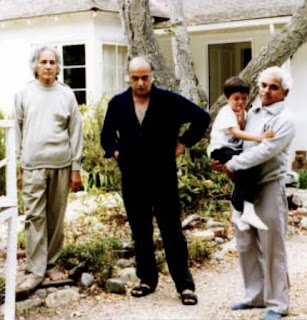Introduction
‘Why a biography of me?’ asked U.G. when I first expressed my desire to write the story of his life. ‘Tell me, how would you go about writing the biography of a person who says he has no story to be told? If my life story is never told, the world would be none the worse for it. For those who delight in reading biographies my story would be disappointing indeed. If they are looking for something in my life to change their lives for the better, they haven't got a chance. You can fit my life neatly into that rhyme for children “Solomon Grundy”. That, in a nutshell, is yours, mine and everybody's story. There's no more to it than that.’
‘What are you, U.G.?’ asked the eighty-four-year-old Swiss lady, Valentine de Kerven, ten years ago over lunch. She had been with U.G. for over twenty years. Most of us at the table stared blankly at her. Her question is the same question asked by all those who have come in contact with U.G. The friend who was instrumental in introducing U.G. to me was himself in a dilemma for years, trying to figure out ‘who’ and ‘what’ U.G. is. His efforts were frustrated at every turn. So one day he decided to put this question to the I Ching. He received the following answer: ‘He is not a guru, not a priest, not a teacher, nor a savant. He has no interest in enlightening you, and in fact does not intend to do anything. He burns brightly with passion and without purpose. He is as lost without you as you are without him. His light dies if you do not reflect it. Your life is dark without his light.’ I might add that U.G.'s passion is certainly not that of an evangelist.
On 9 July 1967 in Saanen, Switzerland, on his forty-ninth birthday, U.G. Krishnamurti died. What brought about this death? What brought him back to life? ‘I don't know. I can't say anything about that, because the experiencer was finished. There was nobody to experience that death at all,’ says U.G. He insists that it was completely a physical and not a psychological death. From that point his life was not under his control, nor was there any entity controlling it. ‘What I am left with is a sort of burnt-out case. The flame still burns. Whether these dying embers of life would have any impact on others or society is not my concern.’
Here perhaps for the first time in the history of mankind is a man who talks of enlightenment as a neurobiological state of being. He says that it is utterly free of religious, psychological or mystical implications. This represents a whole new concept, a new and genuinely fresh approach to the experience. U.G. also scoffs at the sacred, the religious and particularly, at the whole idea of ‘enlightenment’. To religious buffs, his shocking statements are largely unacceptable. He sounds to them like a man wise in his own conceit. And yet, what he says has tremendous significance to those who are searching for enlightenment. U.G. does not give lectures or write books. Furthermore, he emphatically says, ‘If you are searching for someone who will enlighten you, you have come to the wrong man.’
The afterglow of a thousand yesterdays spent with U.G. simmers within me. All art is perhaps born out of the overriding compulsion to share with someone, somewhere, somehow, the intense experiences of the heart. Every artist preserves deep within him, a single source from which, throughout his lifetime, he draws what he is and what he says. And when the source plays out, the work withers and crumbles.
Man is intrinsically a teller of stories. He lives surrounded by his own story and the stories of others. Splicing together the scenes from my memory, I tell you in the pages that follow, my story of this extraordinary man, U.G.
Mahesh Bhatt
September 1991
Carmel, California
